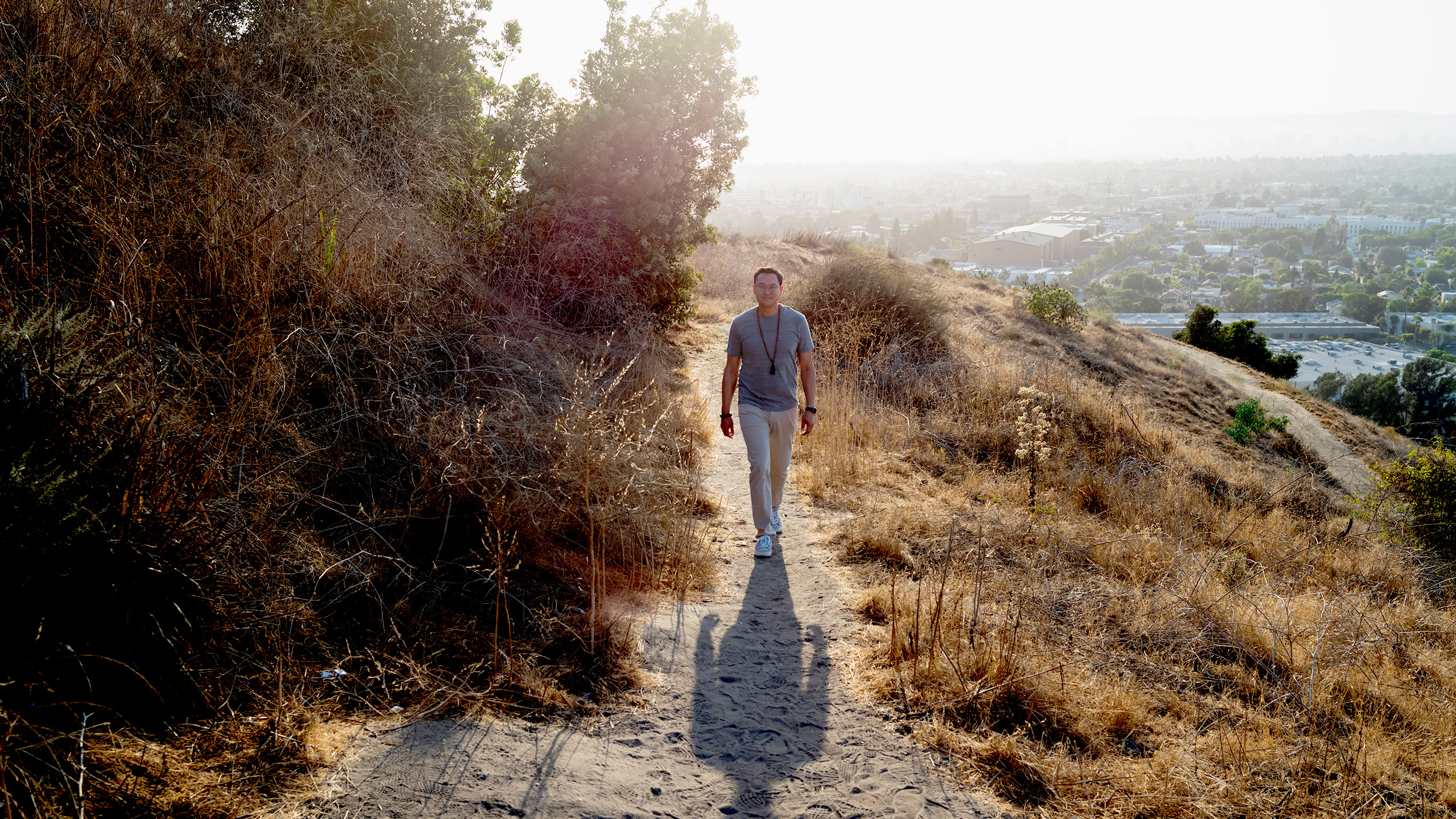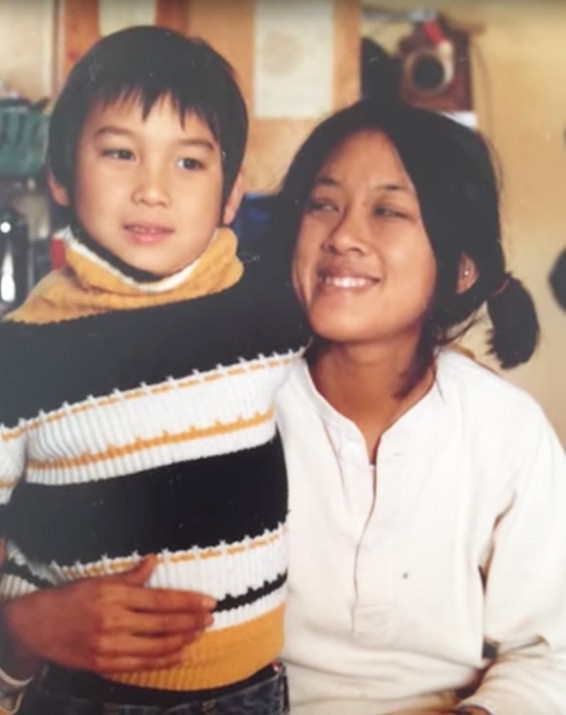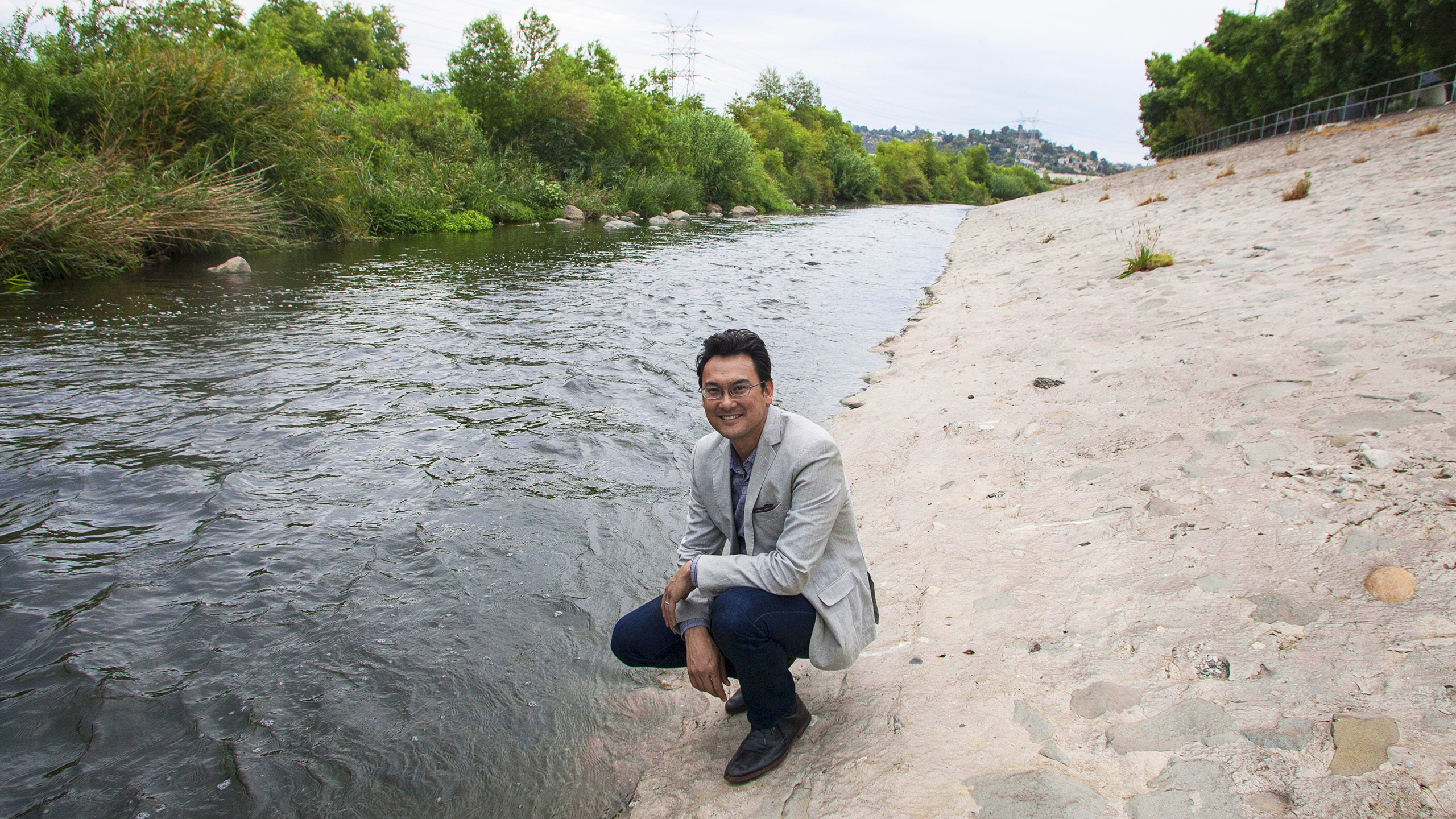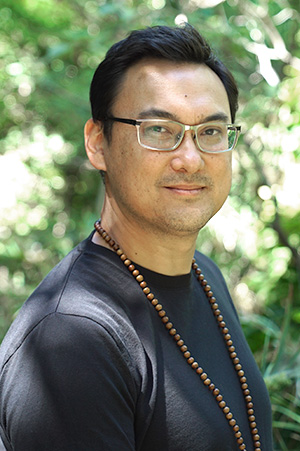
Gratitude: The Antidote to a Fear-Driven Life
With a glowing career and a beautiful family, Omar Brownson had it all. So, why did he feel something was missing? After an exhaustive search, the answer was within him the whole time; he just needed the courage to open his heart.
BY Omar Brownson
I didn't know gratitude was going to change me the way it did.
In early 2014, I was about to turn 40 and life was good. I was married to my high school sweetheart, and we had two beautiful daughters. Having gone to Harvard for grad school, I was fortunate to follow my idealism to create the world in which I wanted to live. A couple of years earlier, I had made a surprising leap from real estate and finance to launching a new civic initiative. I was collaborating with my hero, architect Frank Gehry, to pursue a large-scale project to reimagine the 51-mile Los Angeles River (yes, L.A. has a river). I seemed to have everything for which to be thankful.
Yet, in my heart, I knew something was amiss. I had just been awarded a travel fellowship, and I thought that it would be the perfect opportunity to attend my first silent retreat, something I had always wanted to try but never could muster the courage to do. I did not know what to expect, and taking time to step away from my day-to-day responsibilities felt selfish. However, I listened to my heart and gave myself permission to go—and let go. What did I need to release? For as long as I can remember, I wanted to make my mark on the world. Was it my ego? Or was it a calling? Why was I so driven and ambitious? Six days of quiet contemplation 1,300 feet above the Pacific Ocean in the coastal mountains gave me time and space to breathe. I didn't have a spiritual revelation, but the retreat revealed a deep impatience. I struggled with the slowness and messiness of social change.

At the end of the retreat, I spoke to one of the monks and shared my struggles with impatience for social change. In his black robe, he laughed in my face. He then put his hand on my shoulder and told me that the root word for patience in Latin is patis, meaning "to suffer." Who knew? (And how did he know that I am obsessed with word origins?) He said, "This is your cross." Umm. How do I take this news? In my head, I said, "Gee, thanks"; meanwhile, my heart flooded with questions. Why can't I be content and just accept the status quo? What did I need to accomplish that was so urgent?
If I were to be honest, my urgency was fueled by both hope and fear. I was afraid that I might run out of time to make my mark. (Hello, ego!) Making a mark meant doing something that mattered. I wanted to matter. I grew up feeling unseen, and I did not trust that time nor others were on my side. I was racing against myself, causing my own suffering, even if for the greater good.
Why can't I be content and just accept the status quo? What did I need to accomplish that was so urgent?
Impatiently Waiting Outside
My life started from an unlikely union. My mom is a fourth-generation Chinese-American, and my dad is a white guy from Des Moines, Iowa, who improbably converted to Islam. From the start, my dad had a hard time sticking around, and we moved a lot. By the fourth grade, I had gone to four different schools in two countries. My mom finally had enough of trying to make things work, and she separated from my dad. We moved to Los Angeles to live with my grandmother. All to say, I was always the new kid with a funny name.
In high school, I remember the instructions at the top of every standardized test to complete my name and check one box for ethnicity: white, black, Asian, Latino or other. I always hated that moment. It reinforced that I didn't fit in. Everyone else had their box. Those categories made me feel like an outsider or, even worse, like I didn't even exist. That hurt. Invariably, I would check "other." Otherness initially fed into my feeling that I did not belong. Over time, however, it freed me to follow my own path, and the desire never to be invisible again drove me to make my mark outside any box or category.

Fortunately, I had my mom's unconditional love and a beloved patchwork of coaches and mentors. It did not matter where I was from. I belonged because I was loved. From here, I could go anywhere. I was determined to achieve whatever I put my mind to, and nothing was going to hold me back. I would eventually even look my dad in the eyes and know exactly when and how he had been disappointing, learn how he had been hurt by the absence of his own father, and still thank him for showing up for me in the ways that he could.
Gratitude is the simple act of seeing good revealed in multiple ways.
Learning Gratitude the Hard Way
I'd love to say that after the silent retreat, I forgave myself of needing to prove something and that is why I am grateful. That's not quite the case. Yes, I started to look more inward, but even there I was trying to make my mark. A friend gave me the book Born to Run, by Christopher McDougall, which inspired me to start running, beginning with a couch-to-5K training plan. I then ran two marathons over the next two years. I became obsessed with hitting a pace or a milestone rather than listening to the pain in my body. Pain turned into injury, and I had to stop running. Finally, I had to ask why I am so hellbent on racing against myself.
I realized that I needed to face my fears. I had self-reliance and grit, but I did not know when to be content. I was afraid to trust others because I did not want to get hurt if they disappointed me. I had to develop some faith that good was possible without my willing it. I wanted to be fearless. The original meaning for spirit is "to breathe." Another Latin translation that I love. When we can take a breath and appreciate each moment, we enter the place author Brené Brown calls "enough." This is how I got to gratitude. Enough is enough.
Gratitude is the simple act of seeing good revealed in multiple ways. Gratitude helps us notice what we appreciate, even a simple breath. As a social emotion, gratitude recognizes that something of value has been received at a cost to someone else. Gratitude makes visible what or whom we might be taking for granted. Gratitude also just feels good.

As I rethought how I wanted to embody a grateful life, I came upon professor Ellen Langer's work on mindfulness, which she defines as the simple act of noticing new things. In an article on leadership, she says, "Noticing puts us in the present, makes us sensitive to context, and aware of change and uncertainty." This she calls being awake, or that feeling when you see the world with fresh eyes.
It may not be enlightenment, but my two daughters wake me up a lot and help me to see the world from their not knowing. Everything is new to them, particularly my authority. Seriously. Even just getting them up and out of the house for school can become a battle of wills. The more stressed I am, the slower they move.
My children have taught me to build greater levels of empathy. Only by learning to become more mindful have I begun to better hold their exuberance, which can collide within seconds across hope, excitement or disappointment. I am grateful that my children are incredibly forgiving as I seek to become a father who stays engaged with them, even when it's difficult and being absent seems easier. By being more present, I noticed something: My heart grew bigger. I have been awakened to a fearless gratitude.
The original meaning for spirit is "to breathe." Another Latin translation that I love. When we can take a breath and appreciate each moment, we enter the place author Brené Brown calls "enough." This is how I got to gratitude. Enough is enough.
Your Fearless Future Self
Fearless gratitude makes us whole. Gratitude reminds us that we are not alone and that we can tap into the courage that comes from being connected to something bigger than ourselves.
Today, we have an opportunity to practice gratitude that is relevant to these times. Americans are stressed out. There's been a long-standing narrative that you should pull yourself up by your own bootstraps. The truth is that this mentality leaves too many people feeling alone and trapped. Individual willpower is a shallow container from which to draw energy. I know because I have relied on it a lot. This approach to life is exhausting.
Fortunately, our humanity is wired to give and get gratitude. Gratitude, unlike basic feelings of happiness, sadness, anger or fear, is intrinsically tied to social life, and, according to professor David DeSteno, that provides the key to its effectiveness. This social emotion is a deeper and more replenishing spring from which to draw purpose. His research has found that the underlying power of gratitude is that it helps us to overcome selfish temptations in dealing with other people, and with a very specific person important to our long-term success: one's future self.
Gratitude has changed me. I am learning to feel each moment. By being more present, I can tap into the more inclusive power of thankfulness. This allows me to be more mindful. I still struggle with impatience and trying to control all possible outcomes. Gratitude, however, reminds me that I can only control myself. Emotions are not these wild feelings that happen to us. They are mental shortcuts that we can cultivate with practice.

I started my gratitude practice with a beginner's heart. Small beats. First, I began to consciously notice one or two things each day for which to be grateful. Often, I was just grateful for the smell of coffee brewing in the morning, and that my wife woke up a few minutes earlier to make it. A friend gave me prayer beads to help me literally count my blessings. Marking each bead, or even just one, with a thank-you created a microhabit of gratitude. In our house, when we learn something new, even if difficult, we say, "Practice makes progress."
I have learned that my mindfulness can be measured by my gratitude. By tracking my gratitude, I am choosing to notice what I value. In turn, I feel more thankful.
Mindfulness Measured in Thanks
Sharing my story has been scary and liberating all at once. The reason I have been encouraged to tell it is because I want you to find your fearless gratitude. Somewhere in the first light of morning, the smile of a friend, breaking for a meal or catching your breath, that's where you find your thanks.
Every moment matters. Feeling connected means being engaged right now. What and whom you give thanks for is the measure of your life. In any moment, good or bad, gratitude comes from shifting your heart to feel the world as it unfolds.
Gratitude is an opportunity to make visible what you appreciate. What you are mindful of changes how you experience your life.
Experiencing gratitude isn't an obligation. Gratitude is an opportunity to make visible what you appreciate. What you are mindful of changes how you experience your life. Seeing the world differently actually changes the world you live in—and changes you.
Fearless gratitude is when you can see what is present. There is no fear or stress about what is absent. This courage is how you find calm and satisfaction, and can give thanks. Together, let's make gratitude the new reward for mindfulness.

ABOUT THE AUTHOR
Omar is an entrepreneur, civic leader, speaker and student of gratitude. He is the co-founder and CEO of gthx, the app that seeks to make good visible in the world through the practice of gratitude. Omar is also a leader-in-residence at the software company NationBuilder. He’s a frequent speaker and has been quoted in publications including the Wall Street Journal, New York Times and Los Angeles Times. Previously, Omar was the founding executive director of RiverLA, a nonprofit through which he collaborated with architect Frank Gehry and local leaders to reimagine the 51-mile Los Angeles River. Before leading RiverLA, Omar worked in finance and real estate development. Wherever he is, however, Omar makes sure to take a beat to appreciate the good in his life and is thankful to share the practice of gratitude through gthx.
